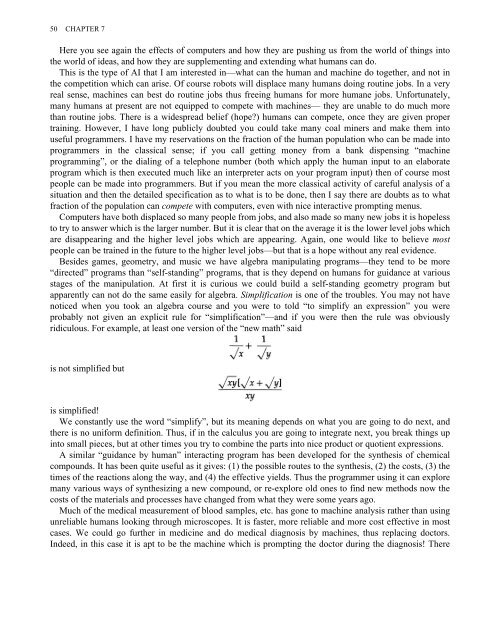hamming
hamming
hamming
Create successful ePaper yourself
Turn your PDF publications into a flip-book with our unique Google optimized e-Paper software.
50 CHAPTER 7Here you see again the effects of computers and how they are pushing us from the world of things intothe world of ideas, and how they are supplementing and extending what humans can do.This is the type of AI that I am interested in—what can the human and machine do together, and not inthe competition which can arise. Of course robots will displace many humans doing routine jobs. In a veryreal sense, machines can best do routine jobs thus freeing humans for more humane jobs. Unfortunately,many humans at present are not equipped to compete with machines— they are unable to do much morethan routine jobs. There is a widespread belief (hope?) humans can compete, once they are given propertraining. However, I have long publicly doubted you could take many coal miners and make them intouseful programmers. I have my reservations on the fraction of the human population who can be made intoprogrammers in the classical sense; if you call getting money from a bank dispensing “machineprogramming”, or the dialing of a telephone number (both which apply the human input to an elaborateprogram which is then executed much like an interpreter acts on your program input) then of course mostpeople can be made into programmers. But if you mean the more classical activity of careful analysis of asituation and then the detailed specification as to what is to be done, then I say there are doubts as to whatfraction of the population can compete with computers, even with nice interactive prompting menus.Computers have both displaced so many people from jobs, and also made so many new jobs it is hopelessto try to answer which is the larger number. But it is clear that on the average it is the lower level jobs whichare disappearing and the higher level jobs which are appearing. Again, one would like to believe mostpeople can be trained in the future to the higher level jobs—but that is a hope without any real evidence.Besides games, geometry, and music we have algebra manipulating programs—they tend to be more“directed” programs than “self-standing” programs, that is they depend on humans for guidance at variousstages of the manipulation. At first it is curious we could build a self-standing geometry program butapparently can not do the same easily for algebra. Simplification is one of the troubles. You may not havenoticed when you took an algebra course and you were to told “to simplify an expression” you wereprobably not given an explicit rule for “simplification”—and if you were then the rule was obviouslyridiculous. For example, at least one version of the “new math” saidis not simplified butis simplified!We constantly use the word “simplify”, but its meaning depends on what you are going to do next, andthere is no uniform definition. Thus, if in the calculus you are going to integrate next, you break things upinto small pieces, but at other times you try to combine the parts into nice product or quotient expressions.A similar “guidance by human” interacting program has been developed for the synthesis of chemicalcompounds. It has been quite useful as it gives: (1) the possible routes to the synthesis, (2) the costs, (3) thetimes of the reactions along the way, and (4) the effective yields. Thus the programmer using it can exploremany various ways of synthesizing a new compound, or re-explore old ones to find new methods now thecosts of the materials and processes have changed from what they were some years ago.Much of the medical measurement of blood samples, etc. has gone to machine analysis rather than usingunreliable humans looking through microscopes. It is faster, more reliable and more cost effective in mostcases. We could go further in medicine and do medical diagnosis by machines, thus replacing doctors.Indeed, in this case it is apt to be the machine which is prompting the doctor during the diagnosis! There


